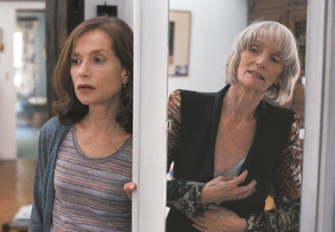
Two highly regarded French directors have released favorably reviewed films within a week of each other, but to my mind one deserves all the praise it has been getting while the other flatters to deceive.
Mia Hansen-Løve gained worldwide recognition with her second feature film, Father of My Children (Le Père de Mes Enfants, 2009) and has directed three other movies, Goodbye First Love (Un Amour de Jeunesse, 2011), Eden (2014), and now Things to Come (L’Avenir), which won her the best director prize at the 2016 Berlin International Film Festival.
Clearly biographical in inspiration (Hansen-Løve’s parents are both philosophy professors), Things to Come focuses on Nathalie (played by Isabelle Huppert), a philosophy professor whose husband Heinz (André Marcon) leaves her for another woman. As Nathalie faces the prospect of her children moving on and deals with a demanding elderly mother (Édith Scob), the film proceeds at a gentle pace without any overly dramatic scenes (even the moment when Heinz tells Nathalie that he is leaving is understated), but I was utterly absorbed by it throughout.
At no point does Hansen-Løve resort to cheap tricks: for example, when Nathalie visits her former student Fabien (Roman Kolinka) in his idealistic mountain commune, one fully expects her to have a passionate affair with him (a formula overused by so many, usually male, directors), but nothing of the sort occurs. Moreover, Hansen-Løve is not afraid to grapple with larger philosophical ideas (books play a prominent part throughout the film), and while these debates might appear contrived in another person’s hands, here they are integral to Nathalie’s inner being as she comes to terms with living on her own.
High-mindedness in this film does not mean unremitting seriousness: there are many moments that are wryly or even absurdly comic, not least when Nathalie takes her mother’s overweight cat Pandora to the mountain retreat and promptly loses it. Huppert has always been an exceptional actress, but the quiet and unshowy way in which she plays her role here makes this her most subtle performance yet.
Quand On A 17 Ans (Being 17), the latest offering from veteran director André Téchiné, whose films include J’Embrasse Pas (I Don’t Kiss, 1991) and Les Roseaux Sauvages (Wild Reeds, 1994), uses a well-worn theme beloved of romcoms: two people who initially have an

antipathy for each other find themselves becoming more and more attached as the movie progresses. Téchiné throws new light on the cliché by making the two principal actors male and aged 17, but their initial mutual dislike comes across as contrived, and the film feels overlong at just under two hours’ duration.
That said, the central performances by Kacey Mottet Klein (as Damien, who is not afraid to accept his sexuality) and Corentin Fila (as Tom, the adopted boy who is more resistant to his emerging feelings) are powerful, and Sandrine Kiberlain, as Damien’s mother, whose husband is away for much of the time in the French army, is touchingly vulnerable. The movie’s setting in the Pyrenees is visually stunning, filmed, as always in Téchiné’s movies, with great beauty.
Favorite
